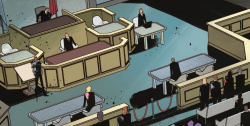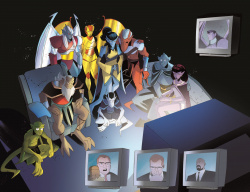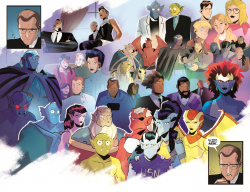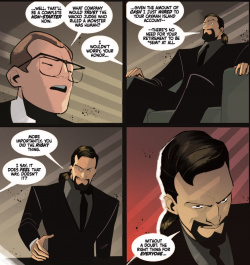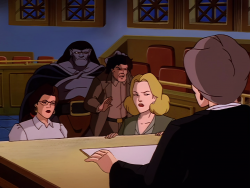Difference between revisions of "Goliath's Hearing"
Phoenician (talk | contribs) (Could still use a Crest/Yale glare pic, but otherwise great choices d:) |
Phoenician (talk | contribs) |
||
| (One intermediate revision by one other user not shown) | |||
| Line 1: | Line 1: | ||
| − | [[Image:Goliath_Hearing_New_Rules.jpg|thumb| | + | [[Image:Goliath_Hearing_New_Rules.jpg|thumb|360px|Tobe Crest makes his closing arguments]] |
'''Goliath's Hearing''' was the two night legal proceeding that culminated in the landmark [[Timeline#1997|1997]] ruling from the [[New York City Criminal Courthouse|New York City Criminal Court]] that determined not only were [[gargoyle]]s sentient, but were also entitled to the same legal rights as any [[human]]. [[Travis Marshall]] of [[WVRN]] declared it the "Hearing of the Century". | '''Goliath's Hearing''' was the two night legal proceeding that culminated in the landmark [[Timeline#1997|1997]] ruling from the [[New York City Criminal Courthouse|New York City Criminal Court]] that determined not only were [[gargoyle]]s sentient, but were also entitled to the same legal rights as any [[human]]. [[Travis Marshall]] of [[WVRN]] declared it the "Hearing of the Century". | ||
| Line 43: | Line 43: | ||
==Roebling's Ruling and Aftermath== | ==Roebling's Ruling and Aftermath== | ||
| − | [[Image:Xanatos_Roebling_New_Rules.JPG|thumb| | + | [[Image:Xanatos_Roebling_New_Rules.JPG|thumb|250px|The right thing for everyone.]] |
Judge Roebling made his ruling before adjourning for the second night. For the first matter before the court, Roebling ruled that Goliath's sentience was "obvious and not truly in question". For the second matter, he ruled that the gargoyle qualified for the same legal rights as any human, explaining the testimony from Goliath and the other witnesses demonstrate that the gargoyle possesses all the qualities the court considers "to be the most 'humane'". Roebling immediately released Goliath from custody, since he was held without cause and not charged with any crime. | Judge Roebling made his ruling before adjourning for the second night. For the first matter before the court, Roebling ruled that Goliath's sentience was "obvious and not truly in question". For the second matter, he ruled that the gargoyle qualified for the same legal rights as any human, explaining the testimony from Goliath and the other witnesses demonstrate that the gargoyle possesses all the qualities the court considers "to be the most 'humane'". Roebling immediately released Goliath from custody, since he was held without cause and not charged with any crime. | ||
| − | Judge Roebling was worried the unprecedented decision would be controversial amongst his colleagues and in the public's eye. These concerns were quietly assuaged by [[David Xanatos]] behind closed doors, who helped Roebling do "the right thing" with a sizeable deposit to the Judge's Cayman Island account toward his retirement. ''("New Rules")'' | + | Judge Roebling was worried the unprecedented decision would be controversial amongst his colleagues and in the public's eye. These concerns were quietly assuaged by [[David Xanatos]] behind closed doors, who helped Roebling do "the right thing" with a sizeable deposit to the Judge's [[Cayman Islands|Cayman Island]] account toward his retirement. ''("New Rules")'' |
As Halcyon Renard explained to Goliath hours after he was released, his gambit for the court to define the gargoyle's legal standing was critical to finalizing his final will and heirs, in that he ultimately bequeathed Goliath with a controlling interest in Cyberbiotics. Goliath would further be offered a position with the Gargoyle Taskforce, which he accepted in exchange for Elisa only receiving a four-month suspension without pay for her failure to disclose the gargoyles to her superiors. ''([[Young At Heart|"Young At Heart"]], [[Cold Comfort|"Cold Comfort"]])'' | As Halcyon Renard explained to Goliath hours after he was released, his gambit for the court to define the gargoyle's legal standing was critical to finalizing his final will and heirs, in that he ultimately bequeathed Goliath with a controlling interest in Cyberbiotics. Goliath would further be offered a position with the Gargoyle Taskforce, which he accepted in exchange for Elisa only receiving a four-month suspension without pay for her failure to disclose the gargoyles to her superiors. ''([[Young At Heart|"Young At Heart"]], [[Cold Comfort|"Cold Comfort"]])'' | ||
Latest revision as of 00:47, 2 December 2024
Goliath's Hearing was the two night legal proceeding that culminated in the landmark 1997 ruling from the New York City Criminal Court that determined not only were gargoyles sentient, but were also entitled to the same legal rights as any human. Travis Marshall of WVRN declared it the "Hearing of the Century".
Contents
Pre-Hearing Motions
On May 15, Judge Ian Roebling began to consider Tobe Crest's motion which questioned the nature and reason behind Goliath's detainment at Rikers Island the previous night, "beyond simply existing". Assistant District Attorney Margot Yale dismissed the entire proceeding, arguing that the gargoyle lacked 'human rights' and therefore had no legal standing to begin with.
The next day, after silencing John Castaway in the gallery, Judge Roebling ruled that the court would entertain determining Goliath's sentience and whether or not he did have legal rights. Declaring that Goliath faced no charges, the proceedings to follow would be a hearing, and not feature a jury, or a final verdict that a trial would typically contain. ("Render Unto Caesar", "Underwater", "Your Witness")
Crest's second motion asked the court for the proceedings to take place at night, so that not only could Goliath attend but so that he could also participate in his defense. A.D.A. Yale continued to be cynical and dismissive, arguing that bringing "a dangerous monster" was a theatrical ploy. Judge Roebling agreed with Crest, who argued that determining Goliath's sentience was no different than a competency hearing. In regard to the question of safety and security for the courtroom and all those present during the proceedings, Roebling spent the afternoon hearing from the head of the Gargoyle Taskforce, Matt Bluestone. After being assured by Bluestone that all necessary precautions would be taken, Judge Roebling granted Crest's motion to schedule the hearing after sundown.
Judge Roebling then heard from Travis Marshall, who asked the court, in the interest of the press and the public, that the hearing be televised live. With no objections from Crest or A.D.A. Yale, Roebling granted Marshall's request. ("Your Witness")
The First Night
Monday, May 19th, 1997. Owen Burnett and Antoinette Dracon watch from the gallery. Goliath is flanked by both GTF officers, Matt Bluestone and Morgan Morgan.
Crest's first character witness was Halcyon Renard. While Renard's testimony vouched for the gargoyle's integrity, restraint, and intelligence, he admitted under cross-examination that he was also the Gargoyle Taskforce's primary benefactor, and largely responsible for Goliath's apprehension in the first place. With A.D.A. Yale satisfied painting Renard as someone who "deep-down" wanted Goliath captured, Crest sought clarification in the redirect. Renard explained that, given that the city was reaching a boiling point regarding the revelation of living gargoyles, he wanted to share to the world what Goliath was like. Suffering from an intense bout of coughing, he was unable to elaborate further.
Judge Roebling asked Renard if he wanted a recess or some water, but Crest didn't have any further questions for the Cyberbiotics CEO. Instead, Crest then called Goliath to the stand. Shackled and wearing a Shock-Collar, Goliath testified how gargoyles were nearly driven to extinction in the Dark Ages, but a few survived into present day. He further shared that neither he nor his clan pose any threat to the humans living in Manhattan, having chosen the island as their protectorate, and seek only to live peacefully as equals. From the broadcast, Travis Marshall remarked at the "astonishing" proof that Goliath could speak.
During cross-examination, Margot tried her best to get a rise out of the gargoyle, accusing him of waiting for his chance to exact vengeance on humanity for what they did to him and his kind. While Goliath admitted to growing angry at the insinuation, he explained how he wouldn't lose his control. A.D.A. Yale changed tactic and explained that many humans would have wanted revenge if they were in Goliath's position, but Goliath disagreed, explaining that their ways were not humanity's ways. Conceding that distinction, Margot wondered aloud how a gargoyle could ever qualify for "human" rights. On that note, Margot ended her questioning.
Crest tried to convince his client to call Elisa Maza as the next character witness, but Goliath objected to the idea. Overall, questioning and cross-examining both Renard and Goliath took about an hour and a half before Roebling adjourned for the night. ("Your Witness")
The Second Night
Tuesday, May 20th, 1997. Maria Chavez and Tri Chung watch from the gallery. Goliath remains restrained.
On the second night of Goliath's hearing, A.D.A. Margot Yale called to the stand Dr. Rostam Vaughn, a medical expert brought in to testify the anatomical differences between gargoyles and humans. Tobe Crest quickly objected, reminding the the court that gargoyles and humans were already conceded to be different species. A.D.A. Yale then called on John Castaway, whose testimony challenged Goliath's historical narrative regarding gargoyle persecution from the previous night. Crest was quick in his cross-examination to discredit Castaway as the leader of a hate group "trying to pass itself off as reasonable". For her last witness, Yale called on the prison guard Renqvist, who detailed the events of Goliath breaking free of his cell to stop the Pack when they attacked Rikers Island. When Crest questioned Renqvist, the lawyer used the testimony to demonstrate how Goliath opted to remain incarcerated and willing to have his night in court, ignoring two chances to escape. Renqvist, however, also admitted he was still afraid of the gargoyle during Yale's redirect, despite Goliath saving his life. ("Your Witness")
Shortly after 11 PM, Crest called a rebuttal witness, Detective Elisa Maza, to the stand, telling a furious Goliath he had to do what was best for his client. There, Elisa not only testified for the first time how she first met Goliath in October 1994, but also about his invaluable help in successfully apprehending multiple suspects for nearly three years. Crest pushed further, and before the court on live television, Elisa revealed her love for Goliath, and their relationship with one another.
On cross-examination, A.D.A. Yale asked if Goliath's role in aiding her in her police duties was ever reported to the press or disclosed to her superior, Captain Maria Chavez. Elisa admitted she kept Goliath a secret to both. Yale also made it clear that Chavez remained in the dark about Goliath even when the Captain appointed Elisa to the Gargoyle Taskforce. Before she was through with the Detective, she accused Elisa of being "unhealthily obsessed" with Goliath, and considered her testimony untrustworthy, asking the Detective why anyone should trust her and her judgement. Roebling excused Elisa without the Detective providing an answer.
After both the Plaintiff and People rested, Crest waived his closing statement. Taking her turn, A.D.A. Yale argued that it was clearly "outside the scope of this court to rewrite the definition of humanity." Crest then opted for a statement in rebuttal, where he called upon Judge Roebling to not be on the wrong side of history, invoking the history of African Americans and their own civil rights movement. "History will not be kind to those who fought for or aided in oppression", Crest argued, pointing out how this decision will be studied and judged for generations to come. ("New Rules")
Roebling's Ruling and Aftermath
Judge Roebling made his ruling before adjourning for the second night. For the first matter before the court, Roebling ruled that Goliath's sentience was "obvious and not truly in question". For the second matter, he ruled that the gargoyle qualified for the same legal rights as any human, explaining the testimony from Goliath and the other witnesses demonstrate that the gargoyle possesses all the qualities the court considers "to be the most 'humane'". Roebling immediately released Goliath from custody, since he was held without cause and not charged with any crime.
Judge Roebling was worried the unprecedented decision would be controversial amongst his colleagues and in the public's eye. These concerns were quietly assuaged by David Xanatos behind closed doors, who helped Roebling do "the right thing" with a sizeable deposit to the Judge's Cayman Island account toward his retirement. ("New Rules")
As Halcyon Renard explained to Goliath hours after he was released, his gambit for the court to define the gargoyle's legal standing was critical to finalizing his final will and heirs, in that he ultimately bequeathed Goliath with a controlling interest in Cyberbiotics. Goliath would further be offered a position with the Gargoyle Taskforce, which he accepted in exchange for Elisa only receiving a four-month suspension without pay for her failure to disclose the gargoyles to her superiors. ("Young At Heart", "Cold Comfort")
Production Background
As early as 1998, Greg Weisman shared his plans for a Gargoyles story where the question before the court would be determining Goliath's sentience. [1] It clearly contrast with the 1996 The Goliath Chronicles episode, "And Justice For All", which took for granted that Goliath was competent to be charged with a crime. [2] As Weisman explained, he thought "most humans, those less open than Elisa, wouldn't even buy talking as enough evidence that the gargs weren't just beasts." [3] Despite his initial notes that dubbed Goliath's courtroom drama a trial, it was eventually more accurately referred to as a hearing when the story debuted in 2023. [4]

